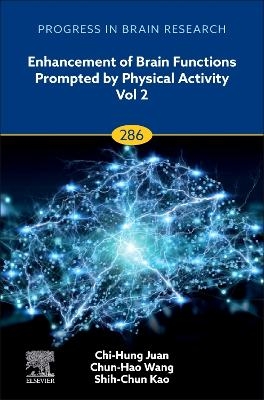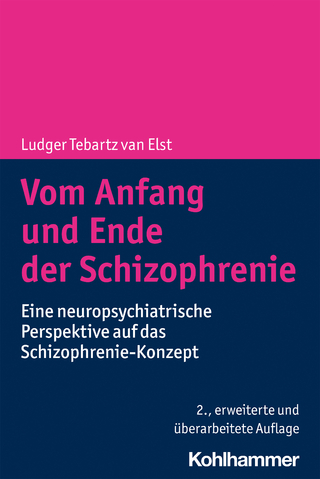
Enhancement of Brain Functions Prompted by Physical Activity Vol 2
Academic Press Inc (Verlag)
978-0-443-31488-9 (ISBN)
Dr. Chi-Hung Juan is a Chair Professor of Cognitive Neuroscience in the Institute of Cognitive Neuroscience, National Central University, Taiwan. He is fascinated by human brain functions and the potential to discover interventions for helping people with cognitive impairments. He majored in Psychology/ Behavioral Sciences for his Bachelor/Master degree at Kaohsiung Medical University, Taiwan. He went to the Department of Experimental Psychology, University of Oxford, UK in 1998 to pursue his PhD degree. In 2002, He finished the PhD program and went to the Department of Psychology, Vanderbilt University, USA for his postdoctoral training on the neural mechanisms of visual cognition. In 2003, he returned to Taiwan and became one of founding members of the institute, where he has stayed to date. He applies eye-tracking, non-invasive brain stimulation (NIBS), electroencephalography, and dynamic analytical methods to investigate human cognition across various groups of people. His lab has elucidated the neural mechanisms of visual attention/working memory/cognitive control and developed effective behavioral and NIBS interventional protocols. This has led to around 120 journal papers and 26 doctoral/postdoctoral graduates. Many former members have now established their own research groups worldwide. Dr. Chun-Hao Wang is affiliated with the Institute of Physical Education, Health & Leisure Studies, and the Department of Psychology at National Cheng Kung University. His research focuses on examining the neurocognitive performance of elite athletes and developing integrated training programs that combine physical exercise and cognitive training. Additionally, Dr. Wang is dedicated to creating comprehensive body-mind fitness regimens and performs extensive analyses using both behavioural and neuroimaging methodologies. Dr. Shih-Chun Kao is an assistant professor in the Department of Health and Kinesiology at Purdue University. The primary goal of Dr. Kao’s research is to better understand the influence of health behavior and its associated biobehavioral correlates on human cognition and brain health. He is particularly interested in the acute and chronic effects of physical activity on behavioral and neuroelectric outcomes related to cognitive function during childhood and early adulthood. His research focuses include (1) the associations of different aspects of physical fitness (e.g., cardiorespiratory fitness, muscular fitness) and motor competence with higher-order cognition such as executive function and memory, (2) the role of exercise parameters (e.g., mode, intensity, timing) on the relationship between exercise and cognitive function, (3) the development of multi-modal interventions combining physical activity and mindfulness that can be implemented and integrated into real-world settings (e.g. school, workplace) for facilitating attention, learning, work productivity, and brain health.
1. Predicting sports performance of elite female football players through smart wearable measurement platform
Chia-Kai Chang, Yu-Lun Chen, and Chi-Hung Juan
2. Physical activity and verbal memory performance: mediating effects of resting-state brain activity
Vera Nina Looser, Markus Gerber, and Sebastian Ludyga
3. Associations between physical activity, body composition, and cognitive performance among female office workers
Yu-Lun Chen, Che-Chien Chang, Meng-Ping Lin, Chia-Chi Lin, Pei-Yu Chen, and Chi-Hung Juan
4. Grip strength, working memory, and emotion perception in middle aged males
Mohamed Aly, Masanori Sakamoto, and Keita Kamijo
5. Association of aerobic fitness and grip strength with cognitive and academic performance in Arab children
Mohamed Aly, Mohamed D. Hassan, Marwa M. Hassan, Mohammed Alibrahim, and Keita Kamijo
6. Mediating Role of Inhibitory Control in Relationships Between Cardiovascular Fitness and Academic Achievement in Preadolescents
Chien-Chih Chou, Ting-Yu Chueh, and Chung-Ju Huang
7. Associations between physical activity, sedentary time, and neurocognitive function during adolescence: Evidence from accelerometry and the flanker P300
Christopher John Brush, Lauren Keith, Nicholas Santopetro, Kreshnik Burani, and Greg Hajcak
8. Exercise habits and mental health: Exploring the significance of multimodal imaging markers
Zai-Fu Yao, Shulan Hsieh, and Meng-Hen Yang
9. Neuroelectric and behavioral outcomes of verbal and spatial working memory in relation to aerobic fitness
Kyoungmin Noh, Nicholas W. Baumgartner, Salim Ibrahim Onbasi, and Shih-Chun Kao
10. A multimodal approach integrating cognitive and motor demands into physical activity for optimal mental health: methodological issues and future directions.
Shih-Chun Kao, Christopher John Brush, and Chun-Hao Wang
| Erscheinungsdatum | 04.06.2024 |
|---|---|
| Reihe/Serie | Progress in Brain Research |
| Verlagsort | San Diego |
| Sprache | englisch |
| Maße | 152 x 229 mm |
| Themenwelt | Geisteswissenschaften ► Psychologie ► Biopsychologie / Neurowissenschaften |
| Naturwissenschaften ► Biologie ► Humanbiologie | |
| Naturwissenschaften ► Biologie ► Zoologie | |
| ISBN-10 | 0-443-31488-8 / 0443314888 |
| ISBN-13 | 978-0-443-31488-9 / 9780443314889 |
| Zustand | Neuware |
| Informationen gemäß Produktsicherheitsverordnung (GPSR) | |
| Haben Sie eine Frage zum Produkt? |
aus dem Bereich


